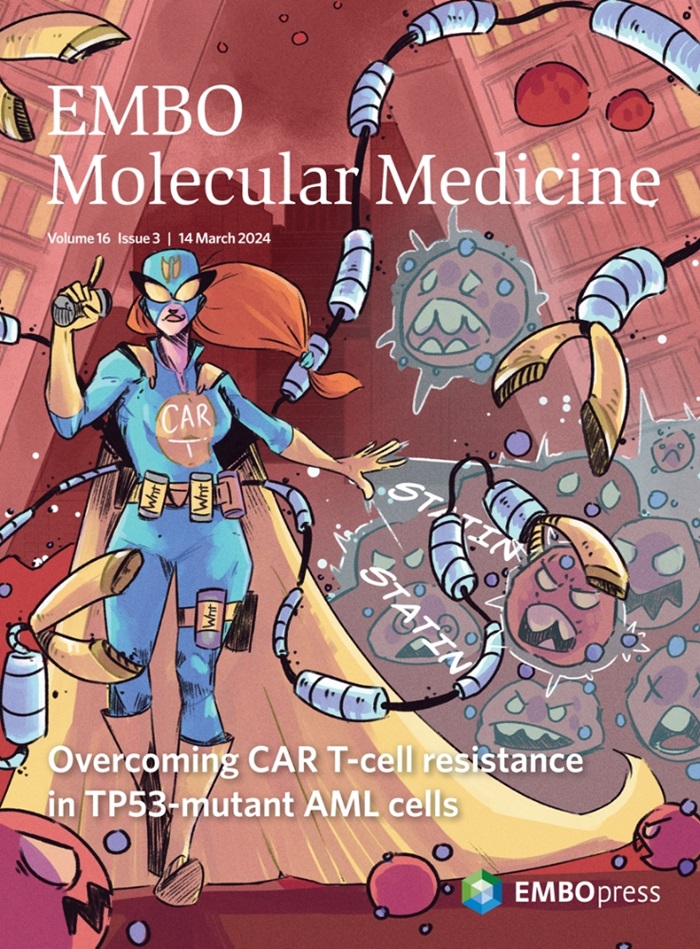High-purity AAV vector production utilizing recombination-dependent minicircle formation and genetic coupling.
IF 9
1区 医学
Q1 MEDICINE, RESEARCH & EXPERIMENTAL
引用次数: 0
Abstract
Triple transfection of HEK293 cells is the most widely used method for producing recombinant adeno-associated virus (rAAV), a leading gene delivery vector for human gene therapy. Despite its tremendous success, this approach generates several vector-related impurities that could potentially compromise the safety and potency of rAAV. In this study, we introduce a method for high-purity AAV vector production utilizing recombination-dependent minicircle formation and genetic coupling (AAVPureMfg). Compared with traditional triple transfection, AAVPureMfg substantially improves vector purity by reducing prokaryotic DNA contaminants by 10- to 50-fold and increasing the full capsid ratio up to threefold. Mechanistically, Bxb1-mediated excision of the transgene cassette generates a minicircle cis construct devoid of bacterial sequences and ensures synchronized colocalization of trans and cis constructs in productive cells. Furthermore, we developed iterations that enhance vector genome homogeneity and streamline the production of rAAV with various transgenes, serotypes, and ITR configurations. Overall, our findings demonstrate that AAVPureMfg overcomes the inherent limitations associated with triple transfection, offering a broadly applicable and easy-to-implement method for producing high-purity rAAV with reduced plasmid costs.利用重组依赖的小环形成和遗传偶联制备高纯度AAV载体。
三次转染HEK293细胞是生产重组腺相关病毒(rAAV)最广泛使用的方法,是人类基因治疗的主要基因传递载体。尽管取得了巨大的成功,但这种方法会产生一些与载体相关的杂质,这些杂质可能会损害rAAV的安全性和效力。在这项研究中,我们介绍了一种利用重组依赖的小环形成和遗传偶联(AAVPureMfg)生产高纯度AAV载体的方法。与传统的三重转染相比,AAVPureMfg通过将原核DNA污染物减少10- 50倍,将全衣壳比例提高3倍,大大提高了载体纯度。从机制上说,bxb1介导的转基因盒的切除产生了一个没有细菌序列的小环顺式构建体,并确保了反式和顺式构建体在生产细胞中的同步共定位。此外,我们开发了迭代,提高了载体基因组的同质性,并简化了各种转基因、血清型和ITR配置的rAAV生产。总的来说,我们的研究结果表明,AAVPureMfg克服了三次转染相关的固有局限性,提供了一种广泛适用且易于实施的方法,以降低质粒成本生产高纯度的rAAV。
本文章由计算机程序翻译,如有差异,请以英文原文为准。
求助全文
约1分钟内获得全文
求助全文
来源期刊

EMBO Molecular Medicine
医学-医学:研究与实验
CiteScore
17.70
自引率
0.90%
发文量
105
审稿时长
4-8 weeks
期刊介绍:
EMBO Molecular Medicine is an open access journal in the field of experimental medicine, dedicated to science at the interface between clinical research and basic life sciences. In addition to human data, we welcome original studies performed in cells and/or animals provided they demonstrate human disease relevance.
To enhance and better specify our commitment to precision medicine, we have expanded the scope of EMM and call for contributions in the following fields:
Environmental health and medicine, in particular studies in the field of environmental medicine in its functional and mechanistic aspects (exposome studies, toxicology, biomarkers, modeling, and intervention).
Clinical studies and case reports - Human clinical studies providing decisive clues how to control a given disease (epidemiological, pathophysiological, therapeutic, and vaccine studies). Case reports supporting hypothesis-driven research on the disease.
Biomedical technologies - Studies that present innovative materials, tools, devices, and technologies with direct translational potential and applicability (imaging technologies, drug delivery systems, tissue engineering, and AI)
 求助内容:
求助内容: 应助结果提醒方式:
应助结果提醒方式:


